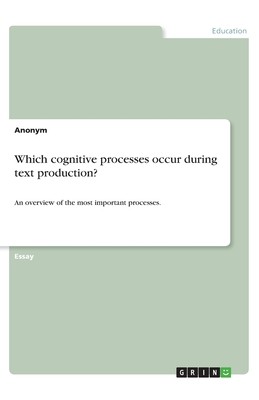
- We will send in 10–14 business days.
- Author: Anonym
- Publisher: GRIN Verlag
- Year: 2019
- Pages: 20
- ISBN-10: 3668974268
- ISBN-13: 9783668974265
- Format: 14 x 21.6 x 0.1 cm, minkšti viršeliai
- Language: English
- SAVE -10% with code: EXTRA
Reviews
Description
Essay from the year 2018 in the subject Didactics - English - Pedagogy, Literature Studies, grade: 1,7, University of Hildesheim (Institut für englische Sprache und Literatur), course: M.Ed. Linguistics - Psycholinguistics, language: English, abstract: The aim of this work is to clarify what kind of challenges arises for language producers when expressing complex language units, beyond word- and sentence planning. Questions like which cognitive processes take place in the planning of text production? or which aspects play a role when it comes to target audience or coherence? are trying to be answer in this essay. In this context, there is no distinction between written or orally produced texts. First of all, I would like to introduce a common language user model from a psycholinguistic point of view. Subsequently, the three basic cognitive processes of speech production: focusing, selection/linearization and encoding, are going to be analyzed more closely. Based on this, I will briefly focus on two descriptive models of cognitive aspects of text production, the description model by Kintsch and the Story-Grammar model by Rummelhart. Finally, I will shortly highlight influential model of writing and written text production in contemporary writing research and their strengths and shortcomings. These models influence writing research methodologies "and therefore specific conceptualizations of writing as an object of inquiry". Hereupon, follows my conclusion, or rather summary, and my references.
EXTRA 10 % discount with code: EXTRA
The promotion ends in 22d.21:20:00
The discount code is valid when purchasing from 10 €. Discounts do not stack.
- Author: Anonym
- Publisher: GRIN Verlag
- Year: 2019
- Pages: 20
- ISBN-10: 3668974268
- ISBN-13: 9783668974265
- Format: 14 x 21.6 x 0.1 cm, minkšti viršeliai
- Language: English English
Essay from the year 2018 in the subject Didactics - English - Pedagogy, Literature Studies, grade: 1,7, University of Hildesheim (Institut für englische Sprache und Literatur), course: M.Ed. Linguistics - Psycholinguistics, language: English, abstract: The aim of this work is to clarify what kind of challenges arises for language producers when expressing complex language units, beyond word- and sentence planning. Questions like which cognitive processes take place in the planning of text production? or which aspects play a role when it comes to target audience or coherence? are trying to be answer in this essay. In this context, there is no distinction between written or orally produced texts. First of all, I would like to introduce a common language user model from a psycholinguistic point of view. Subsequently, the three basic cognitive processes of speech production: focusing, selection/linearization and encoding, are going to be analyzed more closely. Based on this, I will briefly focus on two descriptive models of cognitive aspects of text production, the description model by Kintsch and the Story-Grammar model by Rummelhart. Finally, I will shortly highlight influential model of writing and written text production in contemporary writing research and their strengths and shortcomings. These models influence writing research methodologies "and therefore specific conceptualizations of writing as an object of inquiry". Hereupon, follows my conclusion, or rather summary, and my references.


Reviews